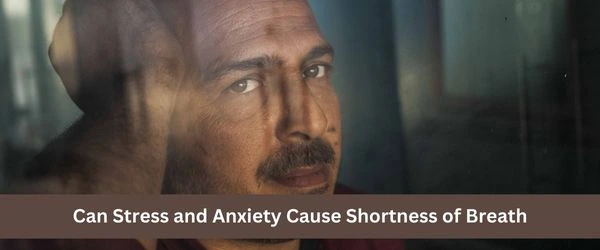Introduction
Stress can sometimes feel like a storm in your chest. Meanwhile, anxiety can feel like a constant weight on your breath. When these two combine, they don’t just take over your thoughts—they can also take your breath away. In fact, it’s more than just feeling overwhelmed; stress and anxiety can create real physical symptoms, such as shortness of breath.
In this blog, we’ll explore the powerful link between stress, anxiety, and breathing difficulties. Specifically, we’ll uncover how the mind and body connect, explain why anxiety might make you feel like you can’t catch your breath, and share actionable strategies to help you breathe easier.
Understanding the Mind-Body Connection
Stress and anxiety don’t just live in your head; they impact your entire body.
Stress and anxiety can manifest as physical symptoms, including shortness of breath, due to the activation of the body’s stress response system, highlighting stress effects on the body.
The mind and body are deeply interconnected through the nervous system. When you’re stressed or anxious, such as in cases of Generalized Anxiety Disorder, your brain releases stress hormones like cortisol and adrenaline. These hormones can trigger physical reactions, including increased heart rate and rapid breathing.
Key Points About the Mind-Body Connection
- The nervous system regulates your breathing, heartbeat, and stress response.
- Stress hormones can amplify physical symptoms like shortness of breath.
- Anxiety can disrupt the balance between mind and body, making you feel out of control.
Your body reacts to stress the same way it would to danger, even when no physical threat exists. This reaction often explains why you might feel breathless during periods of high anxiety.
The Physiology of Anxiety and Shortness of Breath
Why does anxiety make breathing so difficult?
When you’re anxious, your body activates the fight-or-flight response. This reaction is meant to protect you in emergencies, but it can feel overwhelming when triggered by stress or anxiety.
Anxiety can lead to hyperventilation, causing rapid or deep breathing that reduces carbon dioxide levels in the blood, resulting in lightheadedness and shortness of breath.
What Happens During Anxiety-Induced Shortness of Breath
- Hyperventilation: Anxiety often leads to over-breathing, causing dizziness and shortness of breath.
- Panic Attacks: These can cause intense, sudden episodes of breathlessness and chest tightness.
- Tension: Stress can tighten chest muscles, making breathing shallow and difficult.
Understanding these physiological responses can help you recognize and address breathing challenges linked to anxiety.
Common Symptoms of Anxiety-Induced Shortness of Breath
Stress and anxiety can cause various physical symptoms that affect breathing.
Symptoms to Watch For – Shortness of Breath
- Rapid, shallow breathing
- Chest tightness or discomfort
- Feeling like you can’t get enough air
- A sense of panic or impending doom
These symptoms can feel scary, but they are manageable with the right strategies.
Coping Strategies and Treatment
You don’t have to live with the discomfort of stress and anxiety. Here’s how you can regain control of your breathing and overall well-being.
Techniques such as deep breathing exercises, meditation, and journaling, often referred to as Breathing Practices for Stress and Anxiety Reduction, can help manage stress and anxiety, potentially alleviating associated shortness of breath.
Mind-Body Techniques
These strategies can calm your mind and reduce physical symptoms:
- Deep Breathing: Inhale slowly through your nose, hold for a moment, and exhale through your mouth.
- Meditation: Focus on calming thoughts to relax your nervous system.
- Yoga: Gentle movements and mindful breathing can ease stress.
Taking small steps toward relaxation can make a significant difference in your breathing.
Professional Help
Sometimes, expert guidance is necessary:
- Cognitive-Behavioral Therapy (CBT): Helps identify and change thought patterns causing anxiety.
- Medication: Prescribed when symptoms become overwhelming.
Seeking help isn’t a sign of weakness; it’s a step toward healing.
Lifestyle Changes
Building healthy habits can reduce stress and anxiety over time:
- Exercise: Regular physical activity releases feel-good hormones.
- Balanced Diet: Nutritious food supports a healthy mind and body.
- Quality Sleep: Rest is essential for mental resilience.
These simple changes can improve your overall well-being and help you manage symptoms like shortness of breath.
Conclusion: Shortness of Breath
Stress and anxiety can create a cycle of worry and physical discomfort, but fortunately, you don’t have to navigate it alone. To begin with, understanding how stress and anxiety cause shortness of breath is the first step toward finding relief.
If this resonates with you, prioritize self-care, practice breathing exercises, and seek professional guidance when needed.
At the same time, CFC HealingUS is here to support you with compassionate, personalized care. Moreover, let us help you take a deep breath, literally and figuratively, on your journey to healing. So, why wait? Reach out today to take the next step toward a calmer, healthier you.
FAQs
Q: How do you treat shortness of breath from anxiety?
A: Shortness of breath from anxiety can be treated with relaxation techniques like deep breathing exercises, mindfulness, or yoga. Professional therapies, such as CBT, and medications may also be recommended for severe or persistent symptoms.
Q: How do you know if shortness of breath is caused by stress?
A: Stress-related shortness of breath often occurs with other symptoms like rapid heartbeat, chest tightness, or feeling overwhelmed. If it improves with relaxation or stress management, it’s likely linked to stress rather than a medical condition.
Q: What are the symptoms of an anxiety flare-up?
A: Symptoms of an anxiety flare-up include rapid breathing, increased heart rate, sweating, dizziness, chest discomfort, and a sense of panic or dread. Emotional signs like irritability and restlessness may also accompany physical symptoms.
Q: How long can shortness of breath from anxiety last?
A: Shortness of breath from anxiety can last anywhere from a few minutes to several hours. It typically subsides once anxiety levels decrease through relaxation techniques or treatment for the underlying cause.



